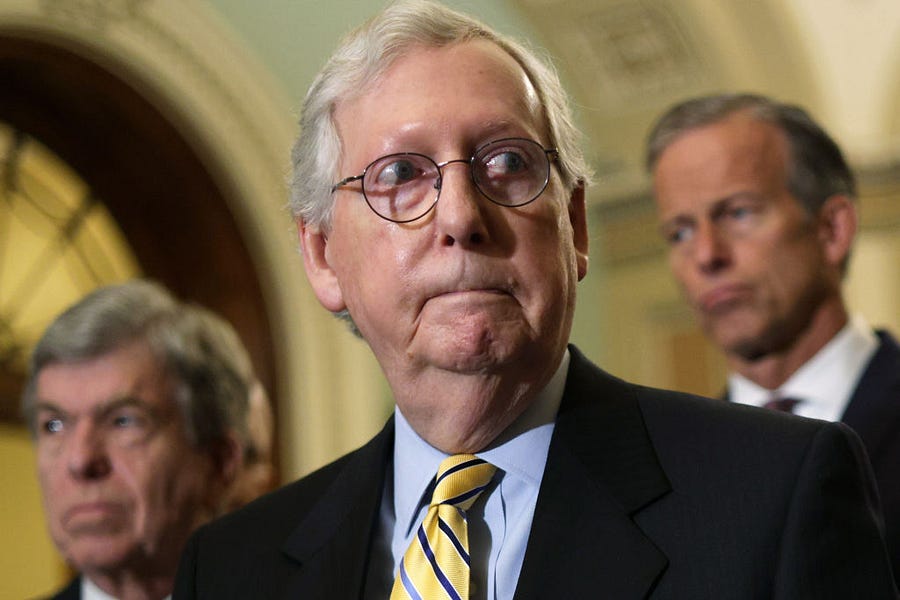Get ready for a deep dive into the 2024 GOP primary next week—this will be your one stop shop for who the likely candidates are (for now), what they’re saying, and the best advice from operatives across the spectrum on what they should be doing this early if they want a chance to compete at “the show.”
But for now …
Campaign Quick Hits
Good news for Democrats (kind of): As of now, only six House Democrats have announced their retirements. For a party that needs to hold onto nearly every seat they’ve got to maintain the majority, stemming the onslaught of redistricting retirements will be key. Why are incumbents so important to keeping the House this time around? There are all the usual reasons, plus we’re in a redistricting cycle—and a delayed one, at that—so the entire campaign cycle gets compressed until after the new district lines are announced. The result is that an incumbent’s advantages are multiplied: “they are armed with high name ID, fully funded coffers and ready-to-go campaign teams for a compressed election.”
Three of those members appear ready to hang up their political spurs in tight swing districts, but the other three are running for higher office instead. Tim Ryan is running for Senate in Ohio for the seat that Rob Portman is vacating, Charlie Crist for Governor in Florida against Ron DeSantis, and Val Demings for Senate in Florida against Marco Rubio. Conor Lamb is expected to announce soon for the Pennsylvania Senate seat that Pat Toomey is leaving behind, which would make Lamb the seventh House Democratic retirement overall.
But plenty of others are running again in a midterm election in which Democrats face strong headwinds. As of now, per Politico, “some swing-seat members in Texas, Pennsylvania and Florida—many of whom were openly mulling futures outside the House—are now expected to stay put.” But the full brunt of redistricting is still unknown, so keep your eye on that number. It’s currently six—but it could grow.
Good news for Republicans (kind of): Here’s some provocative long-term polling that Democrats are chewing on—especially after the New York City mayor’s race seems to have provided even more evidence that the Twitter version of the Democratic Party is way out of step with its median voter. In a great piece in the New York Times, reporter Lisa Lerer noted that “an analysis by Gallup found that the share of white Democrats who identify as liberal had risen by 20 percentage points since the early 2000s. Over the same period, the polling firm found a nine-point rise in liberal identification among Latino Democrats and an eight-point increase among Black Democrats.”
The result is that white progressives are often out of step with voters of color on the very issues where they think they are speaking most directly for those voters: those concerning race. As Lerer put it, “as liberal activists orient their policies to combat white supremacy and call for racial justice, progressives are finding that many voters of color seem to think about the issues quite a bit differently.”
The most progressive candidates in the 2020 Democratic primary—Bernie Sanders and Elizabeth Warren—struggled to win over voters of color, while Joe Biden largely won the nomination with the help of black voters in places like South Carolina. And as the Democratic Party lurched left, at least some voters of color were willing to find a new home in the Republican Party, with the result that “Mr. Trump made larger gains among all Black and Latino voters than he did among white voters without a college degree.”
Smart Republicans will see this and know what to do with it. Crime and immigration are two of Biden’s weakest policy areas overall, in large part because he is being trapped by the left wing of his party. If Republicans can drop the culture warring, the Democrats have left the front door to their base wide open in 2022.
A great line to steal if you want to sound like a smart pundit: “You don’t vote to thank people.” A.B. Stoddard was on the Dispatch Podcast with me and Chris Stirewalt on Friday with that line (which I have stolen). Her point is that midterms aren’t about an administration’s positive accomplishments to date. It’s about what voters are unhappy about—and who they think can fix it. Take a listen and check out her columns.
Conservative means whatever Donald Trump says it means: I’ve said repeatedly that I’m tired of the label conservative, because I don’t know what it means anymore. Last week, FiveThirtyEight found some data to back me up. Based on their research, “a politician’s support for Trump has come to define who party activists think of as conservative.”
Looking at their voting records, Sens. Flake, Sasse, and Cruz were all about the same. “But activists thought Flake and Sasse were significantly more moderate … meanwhile, pro-Trump senators like Jeff Sessions (the first senator to endorse Trump) and Cotton were perceived as far more conservative than their actual voting records indicate.”
I rest my case. The word conservative is now meaningless—or at least it is to me.
Vocabulary Lesson: From Politico, citing The Week’s Matthew Walther: “Barstool conservatives: [Those voters] primarily sharing a ‘disdain for the language of liberal improvement, the hectoring, schoolmarmish attitude of Democratic politicians and their allies in the media, and, above all, the elevation of risk-aversion to the level of a first-order principle by our professional classes.’”
(Overall this is an interesting take on the history and evolution of a certain branch of the GOP, including the Gen X South Park Republicans circa 2001.)
Chris is back with a great headline and even better insight into how Senate Republicans are thinking about the midterms when they talk about the infrastructure deal.
McConnell’s Silver Linings Playbook
The bad news for Mitch McConnell is that he’s got a lot of vacancies on an already very challenging map. The good news is that means he doesn’t have as many incumbents to take care of.
This helps explain the Senate minority leader’s scorching statement Monday demanding that Democratic leaders de-couple the bipartisan infrastructure deal announced last week from another massive spending package Democrats will try to advance on their own.
“Republicans have been negotiating in bipartisan good faith to meet the real infrastructure needs of our nation,” McConnell said. “The president cannot let congressional Democrats hold a bipartisan bill hostage over a separate and partisan process.” McConnell’s threat here is that if Majority Leader Chuck Schumer and Speaker Nancy Pelosi hold up the bipartisan bill to try to get wavering Democratic moderates on board for the porkier, more ideological bill, Republicans will walk away.
The math here is simple: 4>1. There are four Democratic incumbents in potentially competitive races who would benefit from being part of a bipartisan package that dumps half-a-trillion dollars in infrastructure spending on voters just as the 2022 cycle heats up. Sens. Raphael Warnock of Georgia, Mark Kelly of Arizona, Catherine Cortez Masto of Nevada, and Maggie Hassan of New Hampshire would all no doubt like to prove that they can bring home the bacon and fry it up in a bipartisan way. On the Republican side, there’s pretty much just Sen. Lisa Murkowski, one of the gangsters who brokered the deal.
Now, it’s a little more complicated than that. First, Murkowski looks pretty solid, especially under the state’s new ranked-choice jungle primary system. Second, there are some other Republicans who might need some highway help depending on how things play out. Wisconsin Sen. Ron Johnson is just a mess but sounding more and more intent on seeking re-election. Who knows what the heck he thinks is conservative or liberal anymore, but if Johnson is seeking a third term, one supposes he’d be more disposed to voting for free money. And as we discussed last week, Iowa Sen. Chuck Grassley still hasn’t said what he’s going to do, but a big fat highway bill is usually good politics for incumbents. A third potential Republican beneficiary of a pork infusion could be Florida Sen. Marco Rubio, who could end up in a tough race.
With all those caveats in mind, it’s still clear that there are more Democratic incumbents in clear need of a bipartisan win than Republicans. This does not compensate for the fact that McConnell is facing nightmare primary scenarios in Ohio, Pennsylvania, Missouri and, maybe, Iowa. As the early going in Ohio shows, it’s getting ugly out there. But not having to defend incumbents and cater to their demands on votes and legislative priorities is a solid silver lining. Retiring Sens. Rob Portman of Ohio, Roy Blunt of Missouri, and Pat Toomey of Pennsylvania not only don’t need anything from McConnell but can be counted on to vote in the way that best serves Republican aims of recapturing the Senate next year.
Bear this in mind as you watch the negotiations around these two infrastructure proposals. Democrats would like to have everything, but they have more members who need to show that they can work with the other side on a popular issue.










Please note that we at The Dispatch hold ourselves, our work, and our commenters to a higher standard than other places on the internet. We welcome comments that foster genuine debate or discussion—including comments critical of us or our work—but responses that include ad hominem attacks on fellow Dispatch members or are intended to stoke fear and anger may be moderated.
You are currently using a limited time guest pass and do not have access to commenting. Consider subscribing to join the conversation.
With your membership, you only have the ability to comment on The Morning Dispatch articles. Consider upgrading to join the conversation everywhere.